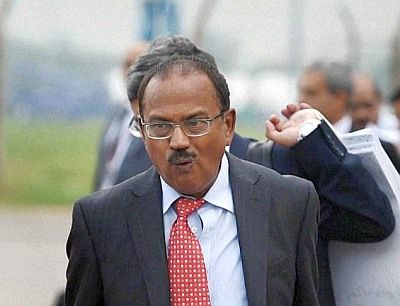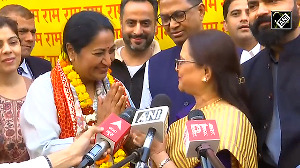 India and China on Monday held the 19th round of talks to resolve the vexed border dispute amid a growing discord between the two nations over Beijing blocking India’s bid to get Jaish-e-Mohammad chief Masood Azhar banned by the United Nations.
India and China on Monday held the 19th round of talks to resolve the vexed border dispute amid a growing discord between the two nations over Beijing blocking India’s bid to get Jaish-e-Mohammad chief Masood Azhar banned by the United Nations.
National Security Advisor Ajit Doval held the annual talks with Chinese counterpart Yang Jiechi to discuss the road ahead to resolve the dispute which has bedevilled bilateral ties.
Besides the border issue, Doval and Yang, the designated Special Representatives, also have a larger mandate to discuss all contentious bilateral, regional and international issues.
Considering their mandate, the second attempt by Beijing in a year to block India’s bids to get the Pakistan terror group’s leaders banned is expected to figure in the talks.
Last month, China had vetoed India’s bid to get the Pathankot attack mastermind designated as terrorist by the UN Sanctions Committee, maintaining that the case ‘did not meet the requirements’ of the Security Council.
The Chinese action evoked a strong reaction in India which said that it was ‘incomprehensible’ that while JeM was banned by the UN, its chief was not.
Indian officials say while Azhar's listing was cleared by the four other UN Security Council permanent members, China has put a ‘technical hold’, like it did in the case of Mumbai terror attack mastermind Zaki-ur-Rehman Lakhvi earlier.
Since China, the veto wielding UNSC member, put a technical hold on Azhar issue, India has voiced its protests.
While India’s UN Permanent Representative Syed Akbaruddin spoke of ‘hidden veto’ at a UNSC open debate on 'Threats to International Peace and Security Caused by Terrorist Acts’ in New York on April 16, External Affairs Minister Sushma Swaraj and Defence Minister Manohar Parrikar called for a review of China’s decision to strike a common stand against terrorism.
For its part, China continued to stick to its stand saying that its decision is based on facts and fairness.
Defending the stand, Chinese Foreign Ministry spokesperson Hua Chunying said on Tuesday, “We oppose double standard in counter terrorism campaign.”
“We have been dealing with the listing (of terrorists by the UN) matter in accordance with the facts and relevant resolutions. We are also in sound communication with all relevant parties including the Indian side,” she said.
Considering the heat generated over it, the issue was expected to figure prominently between Doval and Yang.
Doval is also expected to call on Chinese Premier Li.
Significantly, Li in his meeting with Parrikar on Tuesday said disputes should be handled properly and ties with New Delhi be boosted, state-run China Daily reported on Wednesday.
China will properly manage disputes while boosting bilateral cooperation with India, making contributions to Asia’s economic growth, Li said.
On the border dispute, officials on both sides say the protracted boundary talks made progress, while both sides made attempts to avert tensions along the 3,488-kilometre-long Line of Actual Control, which remains undefined.
While China says the border dispute is confined to 2,000 kilometres, mainly Arunachal Pradesh in eastern sector which it claims as part of southern Tibet, India asserts the dispute covered the whole of the LAC including the Aksai Chin occupied by China during the 1962 war.
When the Special Representatives were appointed in 2003, the two sides set off a three-stage process. The two countries first reached an agreement on the guiding principles and setting political parameters for the settlement in 2005.
Officials say the two sides are currently in the second stage which focuses on working out a framework of settlement to be followed by final step drawing the boundary line based on framework agreement.
On the 19th-round of border talks, Hua said, “We have been working to resolve territorial disputes through negotiations and consultation. China completely settled territorial disputes with 12 of the 14 land neighbours.”
Only the border dispute with India and Bhutan needed to be resolved.
“Both history and practice have proven that it is possible to resolve territorial disputes through negotiation and consolation,” she said.
“During (Wednesday’s) meeting the two sides will work on the framework settlement to work out a plan that is acceptable to both sides,” she said.











 © 2025
© 2025